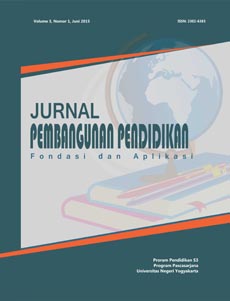The profile of students' metacognition and students' critical thinking: Is it correlate?
DOI:
https://doi.org/10.21831/jppfa.v12i1.77117Keywords:
Critical thinking, metacognition, Metacognitive Awareness Inventory (MAI), junior high school studentsAbstract
References
Adam, M. P., Melissa, S., Medina, & Ashley, N. C. (2019). Developing Critical Thinking Skills in Pharmacy Students. American Journal of Pharmaceutical Education, 2(83). https://doi.org/doi.org/10.5688/ajpe7033
AkcaoÄŸlu, M. í–., Mor, E., & Kí¼lekí§i, E. (2023). The mediating role of metacognitive awareness in the relationship between critical thinking and self-regulation. Thinking Skills and Creativity, 47.
Amin, A. M., Corebima, A. D., Zubaidah, S., & Mahanal, S. (2020). The correlation between metacognitive skills and critical thinking skills at the implementation of four different learning strategies in animal physiology lectures. European Journal of Educational Research, 9(1), 143–163. https://doi.org/10.12973/eu-jer.9.1.143
Dessie, E., Gebeyehu, D., & Eshetu, F. (2024). Motivation, conceptual understanding, and critical thinking as correlates and predictors of metacognition in introductory physics. Cogent Education, 11(1). https://doi.org/10.1080/2331186X.2023.2290114
Dori, Y. J., Avargil, S., Kohen, Z., & Saar, L. (2018). Context-based learning and metacognitive prompts for enhancing scientific text comprehension. International Journal of Science Education, 40(10), 1198–1220. https://doi.org/10.1080/09500693.2018.1470351
Drigas, A., & Mitsea, E. (2020). The 8 pillars of metacognition. International Journal of Emerging Technologies in Learning (IJET), 15(21), 162–178. https://doi.org/https://doi.org/10.3991/ijet.v15i21.14907
Flavell, J. H. (1979). Metacognition and cognitive monitoring: A new area of cognitive developmental inquiry. American Psychologist, 34(10), 906–911. https://doi.org/https://doi.org/10.1037/0003-066x.34.10.906
Gotoh, Y. (2016). Development of critical thinking with metacognitive regulation. International Conference on Cognition and Exploratory Learning in Digital Age.
Hapsari, N. D., & Widodo, A. (2016). Meningkatkan pengetahuan dan keterampilan metakognisi siswa melalui bahan ajar berbasis konstruktivis-metakognitif.
Howard, J. B. (2004). Metacognitive inquiry. NC: School of Education, Elon University.
Inch, E. S., Warnick, B., & Endres, D. (2006). Critical Thinking and Communication: The Use of Reason in Argument (5th ed.). Pearson.
Kozikoglu, I. (2019). Investigating critical thinking in prospective teachers: metacognitive skills, problem solving skills and academic self and academic self-efficacy. Journal of Social Studies Education Research, 10(2), 111–130.
Kuhn, D. (1999). A developmental model of critical thinking. Educational Researcher, 28(2), 16–26. https://doi.org/https://doi.org/10.2307/1177186
Kusuma, A. S., & Busyairi, A. (2023). Relationship between metacognitive skills and critical thinking in elementary science lectures through guided inquiry model. Jurnal Pijar Mipa, 18(5), 727–735. https://doi.org/10.29303/jpm.v18i5.5225
Lipman, M. (1991). Thinking in education. Cambridge University Press.
Lockwood, F. (2003). Metacognition and critical thinking for effective learning.
Macabecha, E. A., Tangcogo, K. T., Sawit, M. R. E., & Ucang, J. T. (2024). Metacognitive Strategy On Students' Mathematics Self-Efficacy And Critical Thinking Skills. International Journal of Applied Science and Research, 7(1), 1–9.
McMilllan, J. H., & Schumacher, S. (2001). Research in Education: A Conceptual Introduction. Priscilla McGeehon.
Mitsea, E., & Drigas, A. (2019). A journey into the metacognitive learning strategies. International Journal of Online and Biomedical Engineering, 15(14). https://doi.org/10.3991/IJOE.V15I14.11379
Nelson, & Thomas, A. (1996). Consciousness and metacognition. American Psychologist, 51(2), 102–116. https://doi.org/https://doi.org/10.1037/0003-066X.51.2.102
Paul, R., & Elder, L. (2007). Critical thinking competency standards. Www. Criticalthinking.Org.
Paul, R., & Linda, E. (2019). The miniature guide to critical thinking concepts and tools. . Rowman & Littlefield.
Pereles, A., Ortega-Ruipérez, B., & Lázaro, M. (2024). THE POWER OF METACOGNITIVE STRATEGIES TO ENHANCE CRITICAL THINKING IN ONLINE LEARNING. Journal of Technology and Science Education, 14(3), 831–843. https://doi.org/10.3926/jotse.2721
Schraw, G., & Dennison, R. S. (1994). Assessing metacognitive awareness. Contemporary Educational Pshycology, 19, 460–475. https://doi.org/https://doi.org/10.1006/ceps.1994.1033
Sholihah, M., Zubaidah, S., & Sisriyati, M. (2016). Keterampilan Metakognitif Siswa SMA Negeri Batu pada Mata Pelajaran Biologi . Prosiding Seminar Nasional Biologi / IPA Dan Pembelajarannya.
Tang, K. S. (2020). The Use of Epistemic Tools to Facilitate Epistemic Cognition & Metacognition in Developing Scientific Explanation. Cognition and Instruction, 38(4), 474–502. https://doi.org/10.1080/07370008.2020.1745803
Tibrani, M. M. (2017). Kesadaran Metakognitif Mahasiswa Program Studi Pendidikan Biologi Universitas Sriwijaya pada Perkuliahan Fisiologi Manusia. Jurnal Pembelajaran Sains , 1–1.
UZUNTÄ°RYAKÄ°-KONDAKí‡I, E., & í‡APA-AYDIN, Y. (2013). Predicting Critical Thinking Skills of University Students through Metacognitive Self-Regulation Skills and Chemistry Self-Efficacy. www.edam.com.tr/estp
Warni, S., & Rosidin. (2018). Measuring metacognitive ability based on science literacy in dynamic electricity topic. Journal of Physics: Conference Series, 948.
Yerdelen-Damar, S., & Eryılmaz, A. (2021). Promoting conceptual understanding with explicit epistemic intervention in metacognitive instruction: Interaction between the treatment and epistemic cognition. Research in Science Education, 51(2), 547–575. https://doi.org/10.1007/s11165-018-9807-7
Published
How to Cite
Issue
Section
Citation Check
License
The Authors submitting a manuscript do so on the understanding that if accepted for publication, copyright publishing of the article shall be assigned to Jurnal Pembangunan Pendidikan: Fondasi dan Aplikasi
 | Jurnal Pembangunan Pendidikan: Fondasi dan Aplikasi by https://journal.uny.ac.id/index.php/jppfa is licensed under a Creative Commons Attribution-ShareAlike 4.0 International License. |













